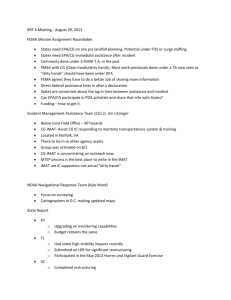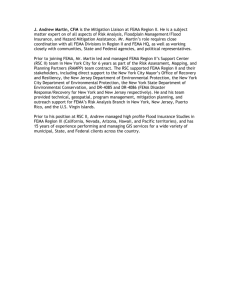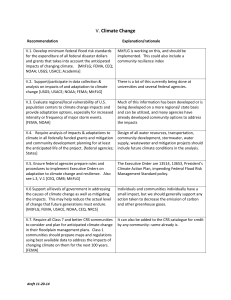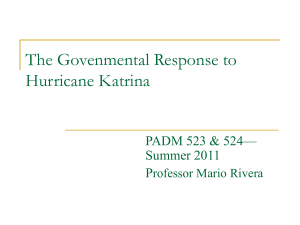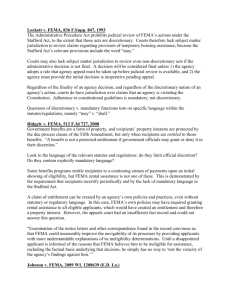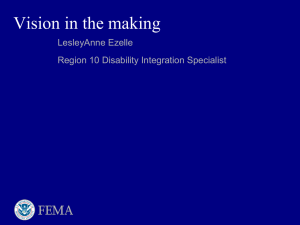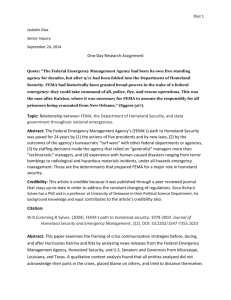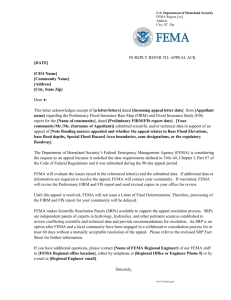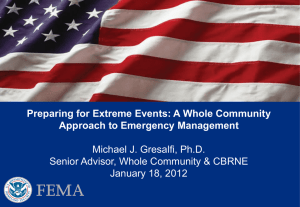Katrina, Storm and Crisis Reading
advertisement
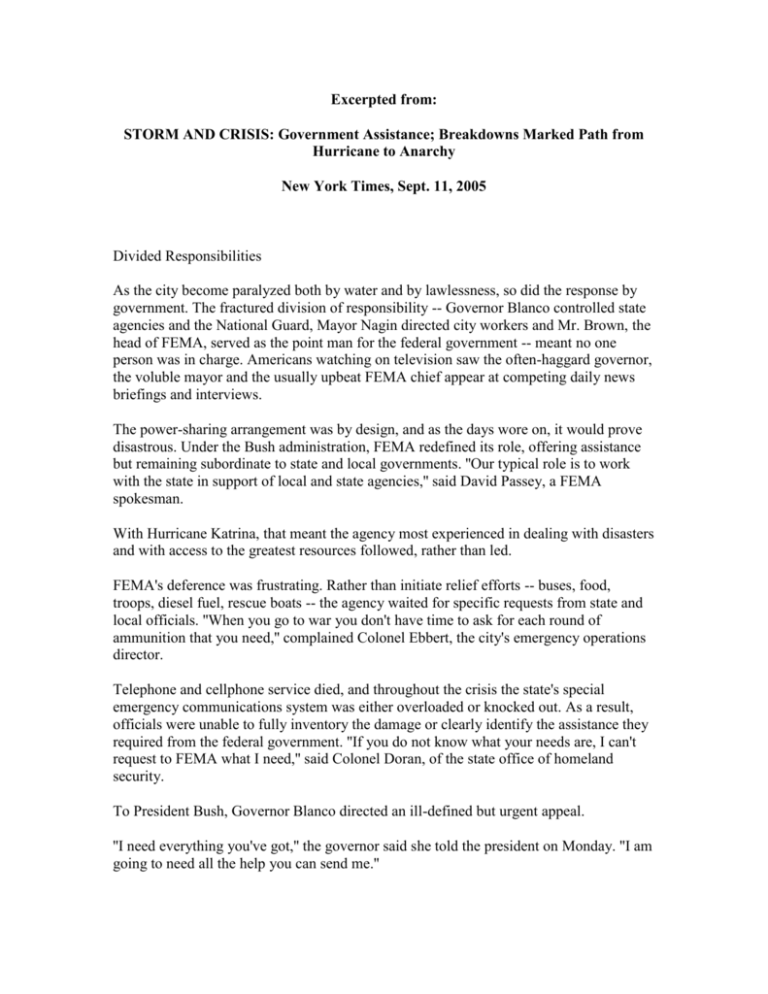
Excerpted from: STORM AND CRISIS: Government Assistance; Breakdowns Marked Path from Hurricane to Anarchy New York Times, Sept. 11, 2005 Divided Responsibilities As the city become paralyzed both by water and by lawlessness, so did the response by government. The fractured division of responsibility -- Governor Blanco controlled state agencies and the National Guard, Mayor Nagin directed city workers and Mr. Brown, the head of FEMA, served as the point man for the federal government -- meant no one person was in charge. Americans watching on television saw the often-haggard governor, the voluble mayor and the usually upbeat FEMA chief appear at competing daily news briefings and interviews. The power-sharing arrangement was by design, and as the days wore on, it would prove disastrous. Under the Bush administration, FEMA redefined its role, offering assistance but remaining subordinate to state and local governments. ''Our typical role is to work with the state in support of local and state agencies,'' said David Passey, a FEMA spokesman. With Hurricane Katrina, that meant the agency most experienced in dealing with disasters and with access to the greatest resources followed, rather than led. FEMA's deference was frustrating. Rather than initiate relief efforts -- buses, food, troops, diesel fuel, rescue boats -- the agency waited for specific requests from state and local officials. ''When you go to war you don't have time to ask for each round of ammunition that you need,'' complained Colonel Ebbert, the city's emergency operations director. Telephone and cellphone service died, and throughout the crisis the state's special emergency communications system was either overloaded or knocked out. As a result, officials were unable to fully inventory the damage or clearly identify the assistance they required from the federal government. ''If you do not know what your needs are, I can't request to FEMA what I need,'' said Colonel Doran, of the state office of homeland security. To President Bush, Governor Blanco directed an ill-defined but urgent appeal. ''I need everything you've got,'' the governor said she told the president on Monday. ''I am going to need all the help you can send me.'' ''We went from early morning to late night, day after day, after day, after day. Trying to make critical decisions,'' Ms. Blanco said in an interview last week. ''Trying to get product in, resources, where does the food come from. Learning the supply network.'' She said she didn't always know what to request. ''Do we stop and think about it?'' she asked. ''We just stop and think about help.'' FEMA attributed some of the delay to miscommunications in an overwhelming event. ''There was a significant amount of discussions between the parties and likely some confusion about what was requested and what was needed,'' said Mr. Knocke, the spokesman for the Department of Homeland Security. As New Orleans descended into near-anarchy, the White House considered sending active-duty troops to impose order. The Pentagon was not eager to have combat troops take on a domestic lawkeeping role. ''The way it's arranged under our Constitution,'' Defense Secretary Donald H. Rumsfeld noted at a news briefing last week, ''state and local officials are the first responders.'' Pentagon, White House and Justice officials debated for two days whether the president should seize control of the relief mission from Governor Blanco. But they worried about the political fallout of stepping on the state's authority, according to the officials involved in the discussions. They ultimately rejected the idea and instead decided to try to speed the arrival of National Guard forces, including many trained as military police. Paul McHale, the assistant secretary of defense for homeland security, explained that decision in an interview this week. ''Could we have physically moved combat forces into an American city, without the governor's consent, for purposes of using those forces -untrained at that point in law enforcement -- for law enforcement duties? Yes.'' But, he asked, ''Would you have wanted that on your conscience?'' For some of those on the ground, those discussions in Washington seemed remote. Before the city calmed down six days after the storm, both Mayor Nagin and Colonel Ebbert lashed out. Governor Blanco almost mocked the words of assurance federal relief officials had offered. ''It was like, 'they are coming, they are coming, they are coming, they are coming,''' she said in an interview. ''It was all in route. Everything was in motion.'' 'Stuck in Atlanta' The heart-rending pictures broadcast from the Gulf Coast drew offers of every possible kind of help. But FEMA found itself accused repeatedly of putting bureaucratic niceties ahead of getting aid to those who desperately needed it. Hundreds of firefighters, who responded to a nationwide call for help in the disaster, were held by the federal agency in Atlanta for days of training on community relations and sexual harassment before being sent on to the devastated area. The delay, some volunteers complained, meant lives were being lost in New Orleans. ''On the news every night you hear, 'How come everybody forgot us?''' said Joseph Manning, a firefighter from Washington, Pa., told The Dallas Morning News. ''We didn't forget. We're stuck in Atlanta drinking beer.'' Ms. Rule, the FEMA spokeswoman, said there was no urgency for the firefighters to arrive because they were primarily going to do community relations work, not rescue. William D. Vines, a former mayor of Fort Smith, Ark., helped deliver food and water to areas hit by the hurricane. But he said FEMA halted two trailer trucks carrying thousands of bottles of water to Camp Beauregard, near Alexandria, La., a staging area for the distribution of supplies. ''FEMA would not let the trucks unload,'' Mr. Vines said in an interview. ''The drivers were stuck for several days on the side of the road about 10 miles from Camp Beauregard. FEMA said we had to have a 'tasker number.' What in the world is a tasker number? I have no idea. It's just paperwork, and it's ridiculous.'' Senator Blanche Lincoln, Democrat of Arkansas, who interceded on behalf of Mr. Vines, said, ''All our Congressional offices have had difficulty contacting FEMA. Governors' offices have had difficulty contacting FEMA.'' When the state of Arkansas repeatedly offered to send buses and planes to evacuate people displaced by flooding, she said, ''they were told they could not go. I don't really know why.'' On Aug. 31, Sheriff Edmund M. Sexton, Sr., of Tuscaloosa County, Ala., and president of the National Sheriffs' Association, sent out an alert urging members to pitch in. ''Folks were held up two, three days while they were working on the paperwork,'' he said. Some sheriffs refused to wait. In Wayne County, Mich., which includes Detroit, Sheriff Warren C. Evans got a call from Mr. Sexton on Sept. 1 The next day, he led a convoy of six tractor-trailers, three rental trucks and 33 deputies, despite public pleas from Gov. Jennifer M. Granholm to wait for formal requests. ''I could look at CNN and see people dying, and I couldn't in good conscience wait for a coordinated response,'' he said. He dropped off food, water and medical supplies in Mobile and Gonzales, La., where a sheriffs' task force directed him to the French Quarter. By Saturday, Sept. 3, the Michigan team was conducting search and rescue missions. ''We lost thousands of lives that could have been saved,'' Sheriff Evans said. Mr. Knocke said the Department of Homeland Security could not yet respond to complaints that red tape slowed relief. ''It is testament to the generosity of the American people -- a lot of people wanted to contribute,'' Mr. Knocke said. ''But there is not really any way of knowing at this time if or whether individual offers were plugged into the response and recovery operation.'' Response to Sept. 11 An irony of the much-criticized federal hurricane response is that it is being overseen by a new cabinet department created because of perceived shortcomings in the response to the Sept. 11, 2001, terrorist attacks. And it is governed by a new plan the Department of Homeland Security unveiled in January with considerable fanfare. The National Response Plan set out a lofty goal in its preface: ''The end result is vastly improved coordination among federal, state, local and tribal organizations to help save lives and protect America's communities by increasing the speed, effectiveness and efficiency of incident management.'' The evidence of the initial response to Hurricane Katrina raised doubts about whether the plan had, in fact, improved coordination. Mr. Knocke, the homeland security spokesman, said the department realizes it must learn from its mistakes, and the department's inspector general has been given $15 million in the emergency supplemental appropriated by Congress to study the flawed rescue and recovery operation. ''There is going to be enough blame to go around at all levels,'' he said. ''We are going to be our toughest critics.''
